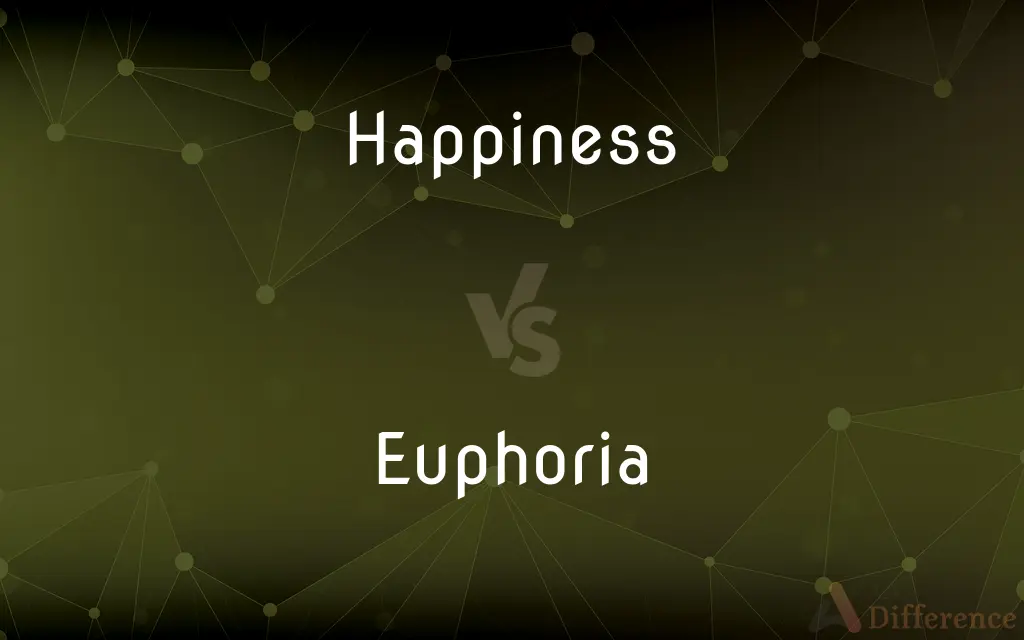Happiness vs. Euphoria — What's the Difference?
By Tayyaba Rehman — Updated on November 5, 2023
Happiness is a state of well-being and contentment, while euphoria is an intense, often overwhelming, feeling of joy and excitement.

Difference Between Happiness and Euphoria
Table of Contents
ADVERTISEMENT
Key Differences
Happiness is a sustained state of contentment and satisfaction with one’s life, a positive emotional condition that is typically stable over time. Euphoria, in contrast, is a more immediate, intense, and often short-lived experience of pleasure or excitement that can feel overwhelming and all-consuming. Happiness is generally seen as something one can cultivate through life choices and attitudes, while euphoria is often a response to specific positive stimuli or events.
The pursuit of happiness is often considered a fundamental human goal, signifying a broad satisfaction with one's circumstances and achievements. Euphoria, however, is a heightened emotional state that may be triggered by particular occurrences such as personal success, love, or the use of certain substances. Happiness tends to be associated with factors like personal fulfillment and emotional well-being, while euphoria might be likened to a psychological 'high'.
While happiness can be affected by external factors, it is often dictated by internal states and attitudes, such as optimism or gratitude. Euphoria, however, can sometimes occur independently of one's general happiness level, induced by certain drugs, manic states, or adrenaline-producing activities. It is possible to experience euphoria even in the absence of overall happiness, which highlights their distinct natures.
Happiness is a term often used in psychological and philosophical discussions about the good life, and it's seen as a long-term goal. Euphoria is more commonly used to describe acute episodes of high emotion that stand out against the background of one's typical emotional state. Happiness is subjective and can be defined differently by different people, whereas euphoria is typically characterized by a universally recognizable intensity of feeling.
In everyday language, people talk about happiness as something they aim to maintain or increase over time, often through building relationships, careers, or personal growth. Euphoria, on the other hand, is usually referred to in terms of moments or events that lead to a sudden surge of pleasure, joy, or adrenaline, such as a roller coaster ride or unexpectedly good news.
ADVERTISEMENT
Comparison Chart
Definition
A state of well-being and contentment
An intense, often fleeting, feeling of joy
Duration
Long-term, stable
Short-term, transient
Trigger
Life satisfaction, personal achievement
Specific stimuli or events, sometimes substances
Intensity
Moderate, can be a 'quiet' joy
Very high, can be overwhelming
Cultivation
Can be pursued and built upon
Often spontaneous and unbidden
Compare with Definitions
Happiness
The feeling of pleasure and fulfillment in life.
His family was the source of his greatest happiness.
Euphoria
An intense state of pleasure and excitement.
Winning the lottery filled him with an unexpected euphoria.
Happiness
A state of well-being characterized by contentment.
Finding happiness in small daily moments is fulfilling.
Euphoria
A psychological state of intense joy.
Hearing her song on the radio for the first time brought her euphoria.
Happiness
An emotion experienced when in a state of well-being.
True happiness for her meant freedom and creativity.
Euphoria
A feeling of great happiness and exhilaration.
She was in a state of euphoria after her engagement was announced.
Happiness
A goal often equated with a good and meaningful life.
The pursuit of happiness drove him to change careers.
Euphoria
A medically recognized state of extreme well-being.
The euphoria post-surgery was attributed to the pain medications.
Happiness
The term happiness is used in the context of mental or emotional states, including positive or pleasant emotions ranging from contentment to intense joy. It is also used in the context of life satisfaction, subjective well-being, eudaimonia, flourishing and well-being.Since the 1960s, happiness research has been conducted in a wide variety of scientific disciplines, including gerontology, social psychology and positive psychology, clinical and medical research and happiness economics.
Euphoria
Euphoria ( (listen)) is the experience (or affect) of pleasure or excitement and intense feelings of well-being and happiness. Certain natural rewards and social activities, such as aerobic exercise, laughter, listening to or making music and dancing, can induce a state of euphoria.
Happiness
Enjoying, showing, or marked by pleasure, satisfaction, or joy
A happy child.
The happiest day of my life.
Euphoria
A feeling or state of intense excitement and happiness
In his euphoria, he had become convinced he could defeat them
Happiness
Cheerful; willing
Happy to help.
Euphoria
A feeling of great happiness or well-being.
Happiness
Characterized by good luck
A happy sequence of events.
Euphoria
An excited state of joy; a feeling of intense happiness.
The runner was in (a state of) absolute euphoria after winning his first marathon.
Happiness
Being especially well-adapted; felicitous
A happy turn of phrase.
Euphoria
(LGBT) gender euphoria
Happiness
Characterized by a spontaneous or obsessive inclination to use something. Often used in combination
Trigger-happy.
Euphoria
A strong pleasant feeling of well-being or happiness; it is often caused by attainment of a desired goal or other incident of accomplishment, but may irrationally accompany a pathological manic state.
Happiness
Enthusiastic about or involved with to a disproportionate degree. Often used in combination
Money-happy.
Clothes-happy.
Euphoria
A feeling of great (usually exaggerated) elation
Happiness
(uncountable) The emotion of being happy; joy.
Euphoria
An overwhelming emotional response to stimuli.
The euphoria from his team's victory lasted for days.
Happiness
Prosperity, thriving, wellbeing.
Happiness
Good luck; good fortune.
Happiness
Fortuitous elegance; unstudied grace; — used especially of language.
Happiness
Good luck; good fortune; prosperity.
All happiness bechance to thee in Milan!
Happiness
An agreeable feeling or condition of the soul arising from good fortune or propitious happening of any kind; the possession of those circumstances or that state of being which is attended with enjoyment; the state of being happy; contentment; joyful satisfaction; felicity; blessedness.
Happiness
Fortuitous elegance; unstudied grace; - used especially of language.
Some beauties yet no precepts can declare,For there's a happiness, as well as care.
O happiness! our being's end and aim!
Others in virtue place felicity,But virtue joined with riches and long life;In corporal pleasures he, and careless ease.
His overthrow heaped happiness upon him;For then, and not till then, he felt himself,And found the blessedness of being little.
Happiness
State of well-being characterized by emotions ranging from contentment to intense joy
Happiness
Emotions experienced when in a state of well-being
Happiness
A long-term feeling of contentment and satisfaction.
Happiness, he realized, came more from giving than receiving.
Common Curiosities
What exactly is euphoria?
Euphoria is an intense, often brief, burst of joy or pleasure.
Is happiness more common than euphoria?
Happiness is generally more common and sustainable than the fleeting state of euphoria.
Does euphoria always indicate a positive experience?
Euphoria is usually positive, but it can also arise from harmful activities or substances.
Can you artificially create euphoria?
Euphoria can be artificially induced by drugs or stimulants, though this can be risky.
Is happiness subjective?
Yes, what constitutes happiness can vary greatly from person to person.
What defines happiness?
Happiness is defined as a state of well-being, joy, and satisfaction.
Does euphoria affect decision-making?
Euphoria can impair judgment, potentially leading to risky decisions.
Can euphoria contribute to long-term happiness?
Euphoria can contribute to happiness if it stems from meaningful experiences.
Are there different levels of happiness?
Yes, happiness can range from quiet contentment to joyous celebration.
Is euphoria a sign of good mental health?
Euphoria can be a natural response to positive events, but if it's drug-induced or unexplained, it may not be a sign of good mental health.
How do culture and society impact happiness?
Cultural values and societal norms can greatly influence what makes people happy.
Are there disorders related to euphoria?
Mania and certain mood disorders can include periods of euphoria.
Is happiness a psychological or physiological state?
Happiness is both psychological and physiological, affecting mind and body.
Can people control their happiness?
People can often influence their happiness through mindset and life choices.
Can everyone experience euphoria?
While most people can experience euphoria, its triggers and intensity can vary.
Share Your Discovery

Previous Comparison
Witty vs. Clever
Next Comparison
Valet vs. ButlerAuthor Spotlight
Written by
Tayyaba RehmanTayyaba Rehman is a distinguished writer, currently serving as a primary contributor to askdifference.com. As a researcher in semantics and etymology, Tayyaba's passion for the complexity of languages and their distinctions has found a perfect home on the platform. Tayyaba delves into the intricacies of language, distinguishing between commonly confused words and phrases, thereby providing clarity for readers worldwide.















































